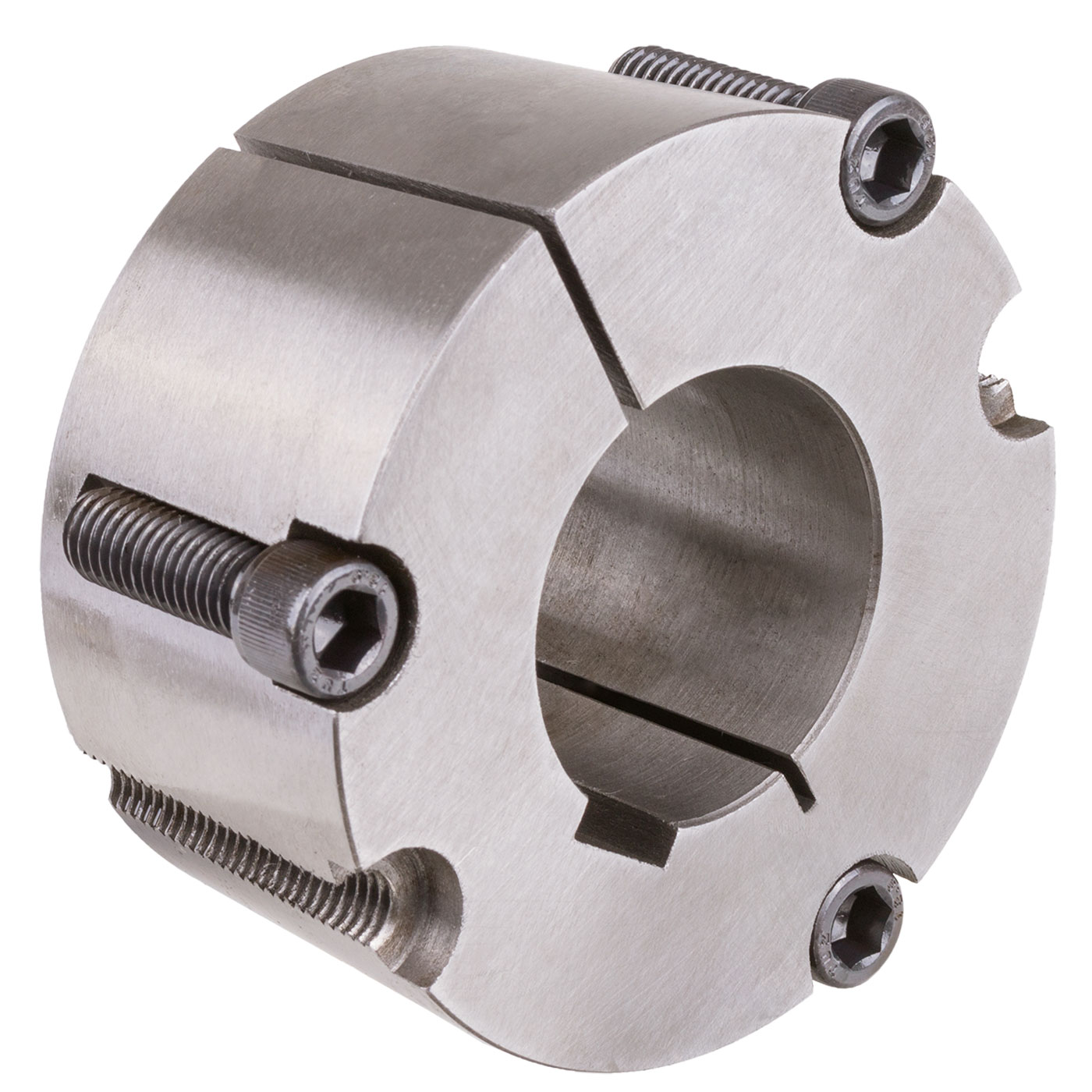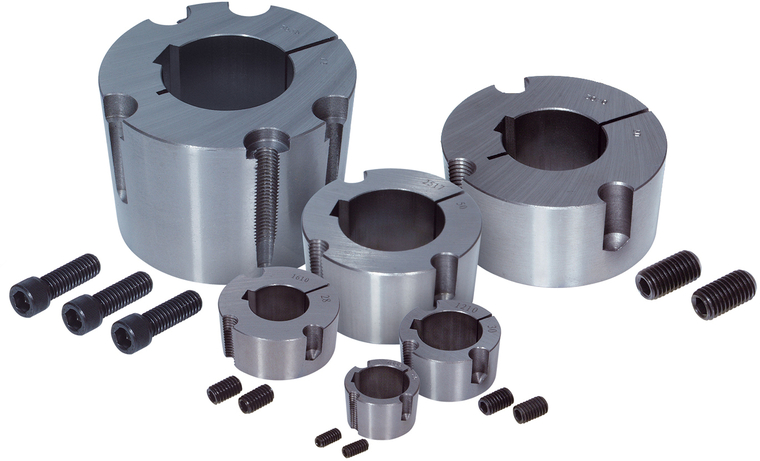Product Description
We supply taper bushing pulley for cast iron v belt pulley with high quality and competitive price.
Taper Lock Bushing models as below:
1
Taper lock bushing features
1. Material: High grade cast iron GG25; Steel C45
2. Surface treatment: Black-phosphated or original color without finishing
3. A full range of both metric and imperial sizes taper bushes are available
4. Complete short reach range available, for compact lightweight assemblies
We are a leading supplier of Taper lock bushes in China and ISO9001:2008 certificated. Most of our Taper lock bushes are exported to Europe and North America. Excellent quality products with the most competitive price is guaranteed.
Applications:
Our taper bush are used in Construction Industry, Fluid Industry, Automotive Industry, Municipal Industry and so on field.
Here are some pictures of our taper bushing.
FAQ
Q1. What is your terms of packing?
A: Generally, we pack our goods in single color box. If you have special request about packing, pls negotiate with us in advance, we can pack the goods as your request.
Q2. What is your terms of payment?
A: T/T 30% as deposit, and 70% before delivery. We’ll show you the photos of the products and packages
before you pay the balance. Other payments terms, pls negotiate with us in advance, we can discuss.
Q3. What is your terms of delivery?
A: EXW, FOB, CFR, CIF.
Q4. How about your delivery time?
A: Generally, it will take 25 to 30 days after receiving your advance payment. The specific delivery time depends
on the items and the quantity of your order.
Q5. Can you produce according to the samples?
A: Yes, we can produce by your samples or technical drawings. We can build the molds and fixtures.
Q6. What is your sample policy?
A: We can supply the sample if we have ready parts in stock, but the customers have to pay the sample cost and
the courier cost.We welcome sample order.
Q7. Do you test all your goods before delivery?
A: Yes, we have 100% test before delivery
Q8: How do you make our business long-term and good relationship?
1. We keep good quality and competitive price to ensure our customers benefit ;
2. We respect every customer as our friend and we sincerely do business and make friends with them,
no matter where they come from.
| Standard Or Nonstandard: | Standard |
|---|---|
| Shaft Hole: | 10-32 |
| Torque: | 70-80N.M |
| Bore Diameter: | 14mm |
| Speed: | 4000r/M |
| Structure: | Flexible |
| Samples: |
US$ 4/Piece
1 Piece(Min.Order) | |
|---|
| Customization: |
Available
| Customized Request |
|---|

Can I get recommendations for taper bushes with anti-corrosion properties?
Yes, there are taper bushes available in the market that offer anti-corrosion properties. These taper bushes are specifically designed to resist corrosion and maintain their functionality and performance in corrosive environments. When selecting taper bushes with anti-corrosion properties, consider the following recommendations:
- Stainless Steel Taper Bushes: Stainless steel is a common material choice for taper bushes that require anti-corrosion properties. Stainless steel contains chromium, which forms a protective oxide layer on the surface, providing excellent resistance against corrosion. Taper bushes made from stainless steel are suitable for applications where exposure to moisture, chemicals, or other corrosive elements is expected.
- Corrosion-Resistant Coatings: Some taper bushes undergo specialized coating processes to enhance their corrosion resistance. These coatings can include materials such as zinc, nickel, or other anti-corrosive substances. The coatings act as a barrier between the taper bush material and the corrosive environment, preventing or minimizing the effects of corrosion. Look for taper bushes that specify corrosion-resistant coatings in their product descriptions or consult with manufacturers for suitable options.
- Polymer Taper Bushes: Certain polymer materials, such as high-performance plastics, offer inherent resistance to corrosion and are suitable for applications where anti-corrosion properties are required. Polymer taper bushes can be lightweight, non-metallic alternatives that provide excellent resistance to various corrosive substances, including chemicals and moisture.
- Sealed or Enclosed Taper Bushes: In some cases, taper bushes are designed with additional features such as seals or enclosures to protect against corrosion. These seals or enclosures help prevent corrosive agents from reaching critical components of the taper bush, ensuring its long-term performance and resistance to corrosion. Look for taper bushes with integrated seals or inquire with manufacturers about options for enhanced corrosion protection.
When seeking taper bushes with anti-corrosion properties, it is essential to consider the specific requirements of your application, including the type of corrosive environment, temperature, and other operating conditions. Additionally, consult with taper bush manufacturers, suppliers, or industry experts who can provide recommendations based on their expertise and product knowledge.
By selecting taper bushes with anti-corrosion properties, you can ensure the longevity and reliability of your equipment in corrosive environments, reducing the need for frequent replacements and maintenance.

What are the common materials used in manufacturing taper bushes?
In the manufacturing of taper bushes, several materials are commonly used, each offering different properties and characteristics to meet specific application requirements. Here are some of the common materials used in the manufacturing of taper bushes:
- Steel: Steel is one of the most widely used materials for manufacturing taper bushes. It offers excellent strength, durability, and resistance to wear and corrosion. Different grades of steel, such as carbon steel or alloy steel, may be utilized based on the specific application demands. Steel taper bushes are suitable for a wide range of industrial applications and can handle high loads and harsh operating conditions.
- Stainless Steel: Stainless steel taper bushes are chosen for applications that require enhanced corrosion resistance. Stainless steel contains a higher percentage of chromium, which forms a protective oxide layer on the surface, providing resistance against rust and corrosion. Stainless steel taper bushes are commonly used in environments where exposure to moisture, chemicals, or high humidity is expected.
- Cast Iron: Cast iron is another popular material for manufacturing taper bushes. It is known for its excellent strength, wear resistance, and vibration damping properties. Cast iron taper bushes are suitable for applications where shock absorption and reduced noise levels are desired. They are commonly used in machinery, automotive, and construction industries.
- Aluminum: Aluminum taper bushes offer advantages such as lightweight, good thermal conductivity, and resistance to corrosion. They are typically used in applications where weight reduction is crucial or where non-magnetic properties are required. Aluminum taper bushes are commonly employed in industries such as aerospace, marine, and electronics.
- Brass: Brass is a material that combines excellent machinability with good corrosion resistance. Brass taper bushes are commonly used in applications where aesthetics and appearance are important, such as architectural or decorative installations. They are also suitable for applications involving electrical conductivity, such as in electrical equipment or grounding systems.
- Plastics: Certain engineering plastics, such as nylon or acetal, are used in the manufacturing of taper bushes. These plastics offer advantages like low friction, self-lubrication, and resistance to chemicals and moisture. Plastic taper bushes are often employed in applications where noise reduction, lightweight construction, or non-magnetic properties are required. They are commonly found in industries such as food processing, packaging, or medical equipment.
The choice of material for taper bushes depends on various factors, including the application environment, load requirements, desired performance characteristics, and cost considerations. It’s important to select a material that provides the necessary strength, durability, and compatibility with other components in the power transmission system.
When seeking taper bushes, it’s advisable to consult with manufacturers, suppliers, or industry experts who can provide guidance on the most suitable material based on your specific application needs and operational requirements.

What is a taper bush, and how does it work in mechanical applications?
A taper bush, also known as a taper lock bushing, is a mechanical component used to secure rotating shafts or hubs to mating equipment, such as pulleys, sprockets, or gears. It provides a reliable and secure connection that can withstand high torque and axial loads. Here’s how a taper bush works in mechanical applications:
A taper bush consists of a tapered sleeve with an external taper and a corresponding tapered bore. The external taper is designed to match the taper of the mating component, while the tapered bore fits onto the shaft or hub. The taper of the bush and the mating component create a tight interference fit when assembled.
The installation process involves sliding the taper bush onto the shaft or hub and then tightening a set of screws or bolts. As the screws or bolts are tightened, they exert radial pressure on the taper bush, causing it to expand and grip the mating component tightly. This creates a frictional connection between the taper bush, the shaft or hub, and the mating component, effectively locking them together.
The advantages of using a taper bush in mechanical applications include:
- Easy Installation: Taper bushings are relatively simple to install. They eliminate the need for complex machining or keyways on the shaft or hub, as the interference fit provides the necessary grip.
- Secure Connection: The taper lock mechanism ensures a secure and backlash-free connection between the shaft or hub and the mating component. It can withstand high torque and axial loads without slipping or loosening during operation.
- Accommodation of Different Shaft Sizes: Taper bushings are available in various sizes and tapers to accommodate different shaft diameters and mating components. This versatility allows for flexibility and interchangeability in mechanical designs.
- Easy Removal and Replacement: In case of maintenance or replacement needs, taper bushings can be easily removed by loosening the set screws or bolts. This facilitates quick disassembly and reassembly without causing damage to the shaft or hub.
- Reduced Downtime: The ease of installation and removal, combined with the secure connection provided by taper bushings, helps minimize downtime during equipment maintenance or component replacement.
Taper bushings are commonly used in a wide range of mechanical applications, including power transmission systems, conveyor systems, industrial equipment, and automotive applications. They offer a reliable and cost-effective method for connecting rotating shafts or hubs to mating components, ensuring efficient power transmission and reliable operation.
When using taper bushings, it’s important to follow the manufacturer’s guidelines for installation and tightening torque to ensure proper functionality and avoid any potential issues.

editor by CX 2023-12-04